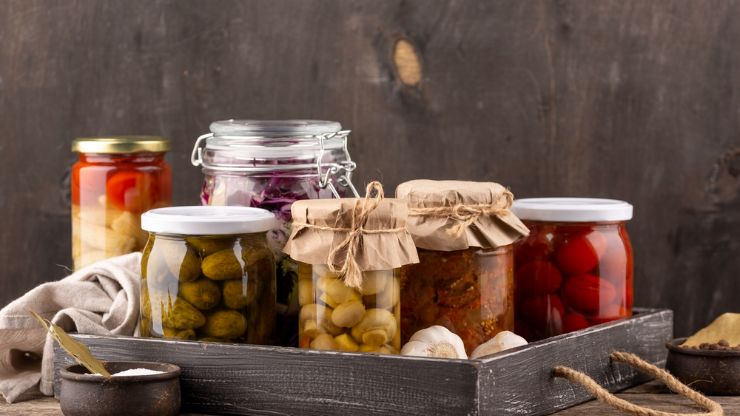Fermentation enthusiasts and culinary explorers, gather ’round! If you’ve ever found yourself captivated by the magic of microorganisms and the transformative power of fermentation, you’re in for a treat. In today’s blog post, we’re diving deep into the world of fermentation by reviewing three of the most popular and influential books on the subject. Whether you’re a seasoned fermenter or just dipping your toes into this ancient culinary art, this Book Review will serve as your compass on a journey to explore the delightful flavors, health benefits, and sheer fascination of fermented foods. So, without further ado, let’s ferment our curiosity and dive into the pages of these ferment-tastic books!
The Art Of Fermentation – Book Review
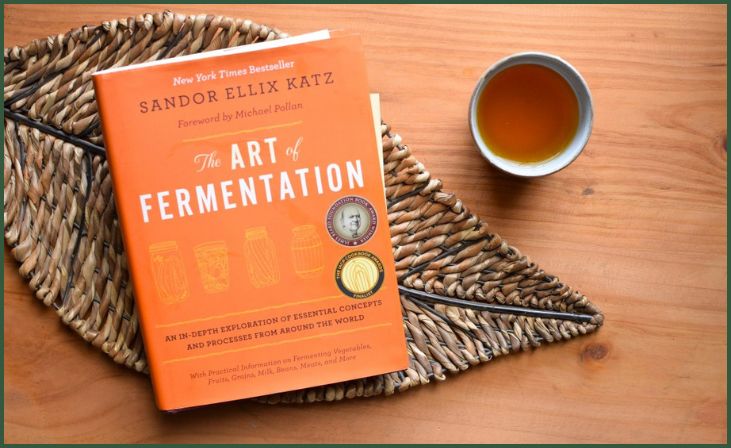
As a dedicated blog writer with a penchant for exploring the world of gastronomy, “The Art of Fermentation” by Sandor Katz was a revelation that left me enthralled from cover to cover. This masterfully crafted tome not only delves into the science and art of fermentation but also invites readers on a captivating journey through the rich tapestry of culinary alchemy.
Also Read:- Stages Of Fermentation
Katz’s prose is as inviting as a well-aged cheese, effortlessly blending scientific precision with a passion for the transformative power of fermentation. From the moment I cracked open the book, I was greeted by a wealth of knowledge presented in a manner that even a novice enthusiast can grasp. His ability to demystify the intricate processes behind fermentation is a testament to his expertise in the field.
One of the book’s most striking features is its comprehensive approach. Katz leaves no stone unturned, covering a wide array of fermentable foods and beverages, from sauerkraut and kimchi to kefir and kombucha. Each chapter is a treasure trove of techniques, recipes, and anecdotes, providing readers with a roadmap to embark on their own fermentation adventures.
What truly sets “The Art of Fermentation” apart is Katz’s reverence for tradition and his celebration of cultural diversity. He seamlessly weaves together stories of ancient fermentation practices from various corners of the globe, highlighting the universal human connection to this age-old culinary tradition. This global perspective not only enriches the reader’s understanding but also fosters a deep appreciation for the profound impact fermentation has had on our collective culinary heritage.
Furthermore, Katz’s emphasis on the symbiotic relationship between humans and microbes is both enlightening and empowering. He elucidates how our coexistence with these microscopic organisms has not only shaped the development of fermented foods but also played a pivotal role in human health and nutrition. This perspective is a testament to Katz’s holistic approach, reminding readers that fermentation is not merely a culinary technique, but a vital component of our biological ecosystem.
The book’s practicality is another commendable aspect. Katz’s instructions are clear and concise, ensuring that readers feel confident in their ability to embark on their own fermentation projects. Whether it’s guiding you through the process of crafting a perfectly tangy batch of sauerkraut or demystifying the intricacies of sourdough bread-making, his step-by-step approach instills a sense of confidence in even the most hesitant of beginners.
Moreover, Katz’s advocacy for experimentation and creativity within the realm of fermentation is truly inspiring. He encourages readers to view recipes as a starting point rather than rigid instructions, empowering them to adapt and innovate based on their own tastes and preferences. This ethos resonated deeply with me as a blog writer, as it underscores the boundless potential for creativity within the world of fermentation.
While “The Art of Fermentation” is undoubtedly a treasure trove of knowledge, it is not without its challenges. The depth of information presented may initially feel overwhelming for those new to the world of fermentation. However, I would argue that this richness is what makes the book an enduring resource, providing ample material for continued exploration and growth.
Overall, “The Art of Fermentation” is a magnum opus that seamlessly blends scientific rigor with a genuine passion for the culinary magic that occurs within a fermentation vessel. Sandor Katz’s expertise, reverence for tradition, and empowering approach make this book a must-read for both budding fermenters and seasoned enthusiasts alike. It has not only deepened my appreciation for the transformative power of fermentation but also inspired me to embark on my own culinary experiments, eager to share the wonders of fermentation with my readers. This book is a true masterpiece in the world of culinary literature and will undoubtedly hold a cherished place on my bookshelf for years to come.
Wild Fermentation – Book Review
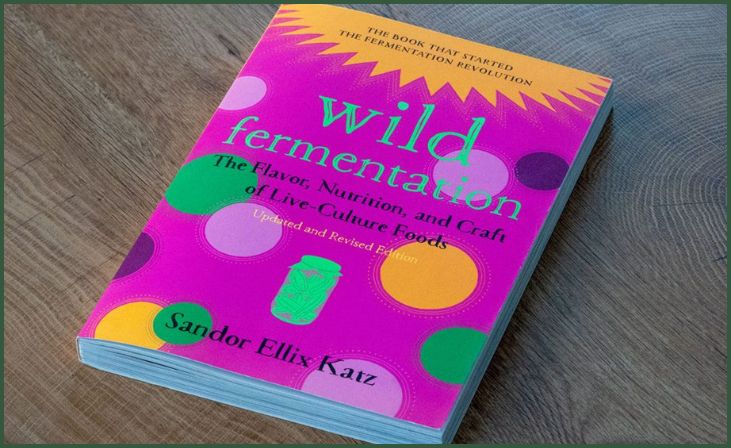
As a blog writer with a penchant for exploring the intricacies of the culinary world, I recently had the pleasure of delving into the captivating realm of fermentation through the pages of “Wild Fermentation” by Sandor Ellix Katz. This book proved to be an illuminating and immersive journey into the age-old practice of harnessing wild microorganisms to transform and preserve foods. With its rich tapestry of knowledge and practical guidance, “Wild Fermentation” is a veritable treasure trove for both novice fermenters and seasoned enthusiasts.
Also Read:- Preserving the Harvest for Winter
Katz’s writing style is a testament to his deep passion for the subject matter. His prose is both accessible and engaging, effortlessly guiding the reader through the fundamentals of fermentation while weaving in anecdotes and personal experiences. This approachable tone serves as a welcoming invitation to the world of wild microbes, making it an ideal companion for those new to the art.
One of the book’s most commendable aspects is its comprehensive coverage of a wide array of fermentable foods. From the staple sauerkraut to the more exotic tempeh and miso, Katz leaves no stone unturned. Each chapter is dedicated to a specific ferment, offering detailed instructions, troubleshooting tips, and valuable insights garnered from years of hands-on experience. This holistic approach ensures that readers are equipped with the knowledge and confidence to embark on their own fermentation adventures.
Furthermore, “Wild Fermentation” is replete with a wealth of historical and cultural context, providing a backdrop against which the reader can appreciate the significance of fermentation in human culinary traditions. Katz’s exploration of global fermentation practices not only adds depth to the narrative but also underscores the universality of this ancient culinary art. Whether discussing Korean kimchi or Ethiopian injera, the author’s genuine enthusiasm for cultural exchange shines through.
The inclusion of personal anecdotes and stories from Katz’s own fermentation journey serves to humanize the process, making it relatable and inspiring. These vignettes offer a glimpse into the trials, tribulations, and triumphs of a seasoned fermenter, creating a sense of camaraderie with the reader. This personal touch sets “Wild Fermentation” apart, infusing it with a warmth and authenticity that is often lacking in instructional guides.
Practicality is a hallmark of Katz’s approach, and this is evident in the book’s emphasis on simplicity and accessibility. Whether you are equipped with a state-of-the-art fermentation chamber or simply a Mason jar and a bit of patience, Katz assures that the world of fermentation is within reach. His encouragement of experimentation and adaptation empowers readers to find their own rhythm within the framework of fermentation, fostering a sense of ownership and creativity.
While “Wild Fermentation” excels in its wealth of information, it does not shy away from addressing the potential challenges and pitfalls that fermenters may encounter. Katz’s troubleshooting section is a valuable resource, offering practical solutions to common issues. This candid acknowledgment of the learning curve associated with fermentation is a testament to the author’s commitment to supporting and empowering his readers.
Don't just scroll, subscribe!
BuzzTrail's unique web-stories are the cure for boredom you've been waiting for.
Overall, “Wild Fermentation” by Sandor Ellix Katz is a masterful exploration of a culinary art that has stood the test of time. As a blog writer with a penchant for uncovering hidden culinary gems, I found this book to be an invaluable addition to my library. Katz’s passion, expertise, and personable approach make this book a standout in the world of fermentation literature. Whether you are a novice eager to embark on your first fermentation project or a seasoned enthusiast seeking to deepen your understanding, “Wild Fermentation” is a must-read. Its pages hold the keys to a world of flavor, culture, and tradition waiting to be unlocked through the transformative power of wild microbes.
Everyday Fermentation Handbook – Book Review
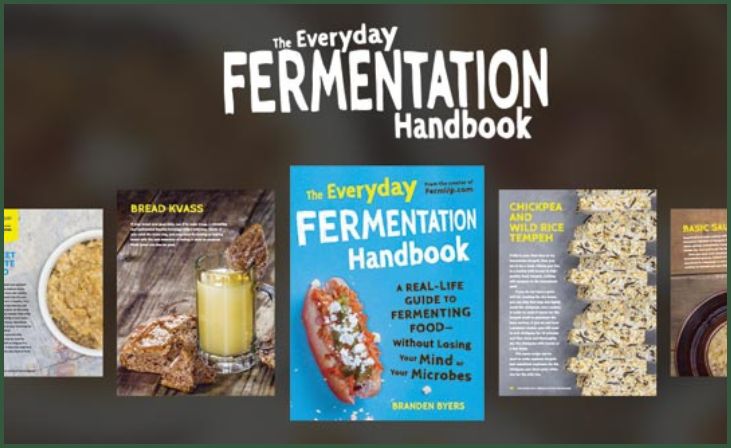
As a dedicated blog writer with a keen interest in culinary adventures, I recently delved into the world of fermentation through the pages of the “Everyday Fermentation Handbook.” Authored by Branden Byers, this comprehensive guide promises to demystify the age-old art of fermentation and bring it within reach of every home kitchen. After a thorough exploration of its contents, I can confidently say that this book not only delivers on its promise but also surpasses expectations.
Also Read:- How Does Alcohol Fermentation Work
The book begins with a thoughtful introduction that sets the stage for the reader’s journey into the fascinating realm of fermentation. The author’s passion for the subject matter is palpable, and their expertise shines through as they explain the science and history behind this ancient preservation technique. This initial section serves as a solid foundation for readers, providing them with a clear understanding of the processes at play.
One of the standout features of the “Everyday Fermentation Handbook” is its accessibility. The author has skillfully crafted the content to cater to both beginners and seasoned fermenters alike. Novices will find the step-by-step instructions and detailed explanations invaluable, while experienced practitioners will appreciate the nuanced insights and advanced techniques peppered throughout the book.
The book covers a wide array of fermentation methods, from the traditional favorites like sauerkraut and kimchi to more adventurous ventures like kefir and miso. Each chapter is a treasure trove of knowledge, offering not only recipes but also a deep dive into the cultural and nutritional significance of the featured ferments. The inclusion of personal anecdotes and historical anecdotes adds a delightful human touch, making the learning experience all the more enjoyable.
One aspect that sets this book apart is its emphasis on using everyday ingredients that are readily available in most kitchens. This practical approach ensures that readers can start their fermentation journey without the need for specialized equipment or hard-to-find ingredients. The author’s insistence on sustainability and accessibility is a refreshing departure from some other fermentation guides that may inadvertently intimidate potential enthusiasts.
The “Everyday Fermentation Handbook” also excels in its attention to detail. The meticulously written instructions leave no room for confusion, guiding the reader through each stage of the fermentation process. Troubleshooting tips are provided for common pitfalls, empowering readers to overcome any challenges they may encounter. Additionally, the book is generously sprinkled with beautiful, full-color photographs that not only serve as visual aids but also ignite the reader’s enthusiasm for trying out the recipes.
One of the book’s greatest strengths lies in its versatility. Whether you’re a health-conscious individual looking to incorporate probiotic-rich foods into your diet or a culinary adventurer seeking to expand your flavor repertoire, this handbook caters to a wide range of interests and dietary preferences. The recipes are adaptable, allowing for creative experimentation and customization to suit individual tastes.
In addition to its practicality, the “Everyday Fermentation Handbook” places a strong emphasis on the health benefits of fermented foods. The author provides well-researched information on the myriad ways in which these probiotic powerhouses contribute to gut health, bolstering the reader’s motivation to incorporate these nutritious creations into their daily meals.
In conclusion, the “Everyday Fermentation Handbook” is a masterfully crafted guide that seamlessly marries the art and science of fermentation. With its accessible approach, in-depth knowledge, and diverse array of recipes, it stands as an indispensable resource for anyone looking to embark on a journey into the world of fermentation. Whether you’re a novice or a seasoned fermenter, this book is sure to inspire and empower you to create your own culinary wonders. I wholeheartedly recommend it to fellow enthusiasts, and I can’t wait to share the fruits (and ferments) of my newfound knowledge on my blog. Happy fermenting!
Fermented Vegetables – Book Review
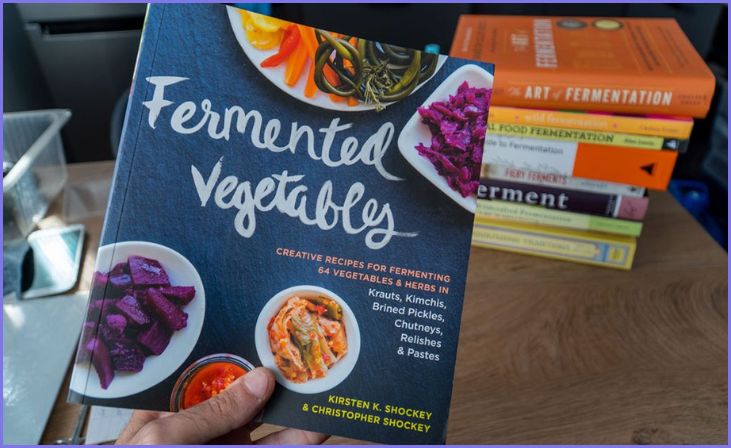
“Fermented Vegetables” is a fun culinary adventure into the world of fermentation that will interest both experienced home cooks and people who are just starting to like food. Author Sandor Katz’s expertise in the art of fermentation shines through in this comprehensive guide.
Katz’s writing style is approachable and user-friendly, making even the most intimidating fermenting processes seem accessible. He begins by explaining the basics of fermentation, ensuring that readers have a solid foundation before diving into the recipes. From sauerkraut to kimchi, and everything in between, the book provides a wide array of recipes for fermenting various vegetables. Each recipe is accompanied by clear instructions, making the fermentation process feel like a manageable and enjoyable kitchen project.
What sets this book apart is Katz’s dedication to demystifying fermentation. He emphasizes the health benefits of incorporating fermented foods into one’s diet, and how they contribute to gut health and overall well-being. His passion for this topic is palpable throughout the book, motivating readers to experiment and embark on their own fermentation adventures.
The photography in “Fermented Vegetables” is another highlight. The vibrant, high-quality images offer a visual feast that inspires readers to get into their kitchens and start fermenting. The combination of clear instructions and enticing visuals makes the book a joy to work with.
In summary, “Fermented Vegetables” is an invaluable resource for anyone interested in the art of fermentation. Whether you’re an experienced fermenter or a curious beginner, this book is an excellent companion on your journey to create healthy and flavorful fermented dishes. Sandor Katz’s passion and expertise shine through, making this a must-have for your cookbook collection.
This book review reflects my personal views as a blog writer.
Conclusion
As we close the chapter on our exploration of the “4 Most Popular Fermentation Books,” one thing becomes abundantly clear – the world of fermentation is a treasure trove of flavors, traditions, and wisdom waiting to be unlocked. These books have served as our guides through the bubbling jars, tangy sauerkraut, and rich kombucha cultures, opening up a world of culinary delights and well-being.
Whether you’re seeking to master the art of sourdough, experiment with homemade kimchi, or simply understand the science behind fermentation, these books offer a wealth of knowledge and inspiration. So, what are you waiting for? Grab one of these titles, roll up your sleeves, and let the magic of fermentation unfold in your kitchen. Your taste buds, gut, and culinary skills will thank you for embarking on this flavorful journey. Happy fermenting!
FAQs
What is fermentation, and why is it so popular?
What is fermentation, and why is it so popular?
Fermentation is a natural process that transforms food through the action of beneficial microorganisms. It’s popular because it not only enhances the flavor of foods but also offers numerous health benefits, from improved digestion to increased nutrient absorption.
Are these books suitable for beginners, or do they require prior knowledge of fermentation?
Are these books suitable for beginners, or do they require prior knowledge of fermentation?
All three books are suitable for beginners and offer information for those new to fermentation. They provide step-by-step guidance and explanations for those just starting their fermenting journey.

